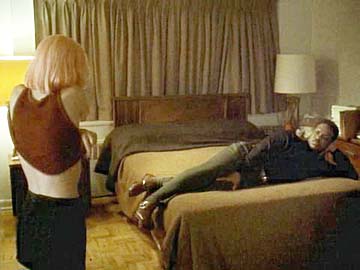


|
Late in Todd Solondz's "Storytelling" there's an image more provocative than anything otherwise depicted in the film, more shocking than the interracial rape scene, more disturbing than the casual drug use, more stunning than the characters' terminal ennui -- a brief shot of the twin towers of the World Trade Center, the buildings rising determinedly through the haze of lower Manhattan. It's a stark and unintentionally bracing moment, and one which Solondz was reportedly asked to remove from his film as a gesture to post-Sept. 11 America. That he didn't is just one of the director's many apropos decisions during the course of an 87-minute movie that's consumed with endings -- of stories, of movies, even of humanity itself. Stalk story
"STORYTELLING"
Rated R
Playing at Signature Dole Cannery

By Scott Vogel
svogel@starbulletin.comSolondz's good sense here shouldn't be surprising. He obviously meditated long and hard on the subject of depiction, and specifically the ways reality is first captured and then altered by creative fiction writers and documentarians, suburban housewives and teenage burnouts. The first section of the two-part film, entitled "Fiction," goes straight to the epicenter of depiction apprenticeship, namely a college creative-writing class packed with equal parts dweebs and poseurs.
If you've ever endured one of these courses you know that there are few things as horrifying as watching a writer's first draft suffer the slings and arrows of his fellow classmates. Such a thing happens to Marcus (Leo Fitzpatrick), a writer with cerebral palsy who's written a story about a man with cerebral palsy.
"Those adjectives are flat-footed and redundant," critiques one student. "I found it East Coast and disabled," says another. The writing teacher (Robert Wisdom), a towering, Pulitzer prize-winning black novelist, is even less equivocal, destroying Marcus with a single word that leaves the kid fleeing the class in tears.
But it's the second half of "Fiction" that's most aggressively thought-provoking. Depicted here is a brutal sex scene between the teacher and one of his other students, Marcus' girlfriend Vi (Selma Blair), a sequence which the MPAA wanted excised from "Storytelling" in exchange for granting an R rating. Solondz again refused, instead offering a cheeky compromise. The scene's still in the film, but during its most graphic moments the principals are obscured by a giant red rectangle superimposed clumsily over the action. Suffice it to say that the scene is just as raw as the original probably was; plus Solondz gains an extra comment on depiction's compromises.
The second vignette, "Non-Fiction," concerns Toby (Paul Giamatti), a novice documentarian casting about for a subject worthy of his lens. He finds it in the family of Scooby Livingston (Mark Webber), an adrift New Jersey adolescent whose ramblings Toby hopes to edit into a coherent portrait of suburban angst (one of those proliferating post-Columbine flicks).
Scooby who, in response to questioning by his career counselor, says that he wants "to be on TV like Conan or early Letterman," seems an apt metaphor for the twisted longings of kids these days, and Toby zeros in on a family that's straight out of Solondzland: dad with his horned rim glasses (John Goodman), mom a brittle if well-coiffed platitude dispenser (Julie Hagerty), the three kids running the gamut from star athlete to brown-noser to druggie. Not to be forgotten is the Salvadoran cook Consuelo (Lupe Ontiveros), who prepares Martha Stewartesque meals for the family only to eat her own dinner alone in the kitchen.
During numerous editing sessions and later at a test screening, Toby struggles to portray the Livingstons as they "really are," only to discover that some viewers find the quintet screamingly funny while others see them as tragic and pathetic. A third group, meanwhile, takes Toby to task for his vision's inconsistency, pressing him to settle on either contempt or empathy for the family, but not both.
Not coincidentally, Solondz himself has been taken to task on this very issue. Some critics see him as a sneering elitist, others as a reliable chronicler of contemporary perversity. But he can't really be nailed down, which is what makes his work so impressively confounding. One can toss out any number of flat-footed adjectives -- "funny," "absorbing," "cartoonish," "tragic" -- but none really captures the experience of watching "Storytelling." Which is somehow appropriate for a film that's less about what's watched than who's watching it.
Click for online
calendars and events.